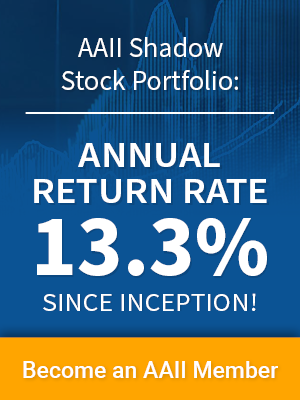Based on key financial metrics such as the price-to-sales ratio, shareholder yield and the price-earnings ratio, the following 3 stocks made the list for top value stocks in the Consumer Finance industry. Those looking for value stocks to add to their portfolio may want to use this list as a starting point for further investment research.
Why Focus on Undervalued Consumer Finance Stocks?
Value investors seek to buy stocks at a discount to their intrinsic value. Long-term returns show that such strategies are advantageous. Value stocks, as a group, tend to outperform growth stocks over extended periods of time. Typically, value investors perform financial analysis of numerous metrics, don’t follow the herd and are long-term investors.
AAII’s A+ Investor Value Grade is derived from a stock’s Value Score. The Value Score is the percentile rank of the average of the percentile ranks of the price-to-sales ratio, price-earnings ratio, enterprise-value-to-EBITDA (EV/EBITDA) ratio, shareholder yield, price-to-book-value ratio and price-to-free-cash-flow ratio. The score is variable, meaning it can consider all six ratios or, should any of the six ratios not be valid, the remaining ratios that are valid. To be assigned a Value Score, stocks must have a valid (non-null) ratio and corresponding ranking for at least two of the six valuation ratios.
What Goes Into AAII’s Value Grade?
Stock evaluation requires access to huge amounts of data as well as the knowledge and time to sift through it all, make sense of financial ratios, read income statements and analyze recent stock movement. AAII created A+ Investor, a robust data suite that condenses data research in an actionable and customizable way suitable for investors of all knowledge levels, to help investors with that task.
AAII’s proprietary stock grades come with A+ Investor. These offer intuitive A–F grades for more than just value. It is possible for a stock to appear cheap based on one valuation metric but appear expensive on another. It is also possible for one valuation ratio to be associated with outperforming stocks during certain periods of time but not others. Some stocks may even have null values for certain metrics like the price-earnings ratio or the price-to-book ratio but not others. An example of this would be a company with losses instead of profits or a negative book value because of heavy borrowing. Negative earnings or book value result in non-meaningful ratios that are left blank or null.
Click the button below to learn more about A+ Investor and subscribe today.

3 Undervalued Consumer Finance Stocks
Of course, there are countless value stocks that are worth mentioning, but this is a concise list of the top 3 undervalued stocks in the Consumer Finance industry for Tuesday, November 18, 2025. Let’s take a closer look at their individual scores to see how they measure up against each other and the Consumer Finance industry median.
| Company | Ticker | Price/Sales | Price/Earnings | EV/EBITDA | Shareholder Yield | Price/Book Value | Price/Free Cash Flow | Value Grade |
| Credit Acceptance Corporation | CACC | 4.02 | 11.1 | na | 8.4% | 2.95 | 4.6 | B |
| Green Dot Corporation | GDOT | 0.29 | na | na | (3.1%) | 0.64 | 6.0 | A |
| LendingClub Corporation | LC | 1.42 | 18.2 | 5.2 | (2.6%) | 1.28 | na | B |
The Value Grade is assigned based on how each stock’s composite valuation compares to all other stocks.
The process for assigning grades starts with each variable for a given stock. The percentile rankings for all valid ratios that a stock has are calculated. So, for instance, a stock could have a price-to-book ranking in the 43rd percentile, a price-earnings ranking in the 67th percentile, a price-to-sales ranking in the 23rd percentile, etc. Then, those rankings are averaged for each stock. (A minimum of two valid variables are required, though all six will be used if available.)
Once the average of the individual variables is calculated, that average is ranked against all stocks. Put another way, each stock’s composite valuation is compared to all other stocks. These ranks are then sorted into quintiles from the cheapest 20% (a grade of A) to the most expensive 20% (a grade of F).
As always, we recommend that you conduct proper due diligence and research before investing in any security. We also suggest that investors utilize numerous grades, not just value, when it comes to deciding whether a company is a good fit for their allocation needs.
Credit Acceptance Corporation’s Value Grade
Value Grade:
| Metric | Score | CACC | Industry Median |
| Price/Sales | 74 | 4.02 | 1.17 |
| Price/Earnings | 23 | 11.1 | 10.0 |
| EV/EBITDA | na | na | 8.0 |
| Shareholder Yield | 7 | 8.4% | 2.2% |
| Price/Book Value | 65 | 2.95 | 1.23 |
| Price/Free Cash Flow | 9 | 4.6 | 4.2 |
Credit Acceptance Corporation engages in the provision of financing programs, and related products and services in the United States. The company advances money to automobile dealers in exchange for the right to service the underlying consumer loans; and buys the consumer loans from the dealers and keeps the amount collected from the consumers. It is also involved in the business of reinsuring coverage under vehicle service contracts sold to consumers by dealers on vehicles financed by the company. The company serves independent and franchised automobile dealers. The company was incorporated in 1972 and is headquartered in Southfield, Michigan.
Stocks with a Value Score from 81 to 100 are considered deep value, those with a score between 61 and 80 are value and so on.
Credit Acceptance Corporation has a Value Score of 72, which is considered to be undervalued.
When you look at Credit Acceptance Corporation’s price-to-sales ratio at 4.02 compared to the industry median at 1.17, this company has a higher price relative to revenue compared to its peers. This could make Credit Acceptance Corporation’s stock less attractive for value investors.
Credit Acceptance Corporation’s price-earnings ratio is 11.10 compared to the industry median at 10.00. This means it has a higher share price relative to earnings compared to its peers. This could make Credit Acceptance Corporation less attractive for value investors.
Shareholder yield is the sum of a stock’s dividend yield (paid over previous 12 months minus special dividends) and the percentage of net share buybacks over the previous 12 months. Credit Acceptance Corporation’s shareholder yield is higher than its industry median ratio of 2.20%. Value investors may look for an attractive shareholder yield because it can be a powerful tool for identifying if the company has a good management team.
As one of the most common value metrics, the price-to-book ratio evaluates a company’s current market price relative to its book value. Credit Acceptance Corporation’s price-to-book ratio is higher than its industry median ratio of 1.23. This could make Credit Acceptance Corporation less attractive to investors looking for a new addition to their portfolio.
Lastly, let’s take a look at Credit Acceptance Corporation’s price-to-free-cash-flow ratio (P/FCF), which can indicate a company’s market value relative to its operating cash flow. Credit Acceptance Corporation’s price-to-free-cash-flow ratio is higher than its industry median ratio of 4.20. This could make Credit Acceptance Corporation less attractive because the higher P/FCF ratio indicates that Credit Acceptance Corporation is undervalued. The P/FCF ratio metric can also be viewed over a long-term time frame to see if the company's cash flow to share price value is generally improving or worsening.
Green Dot Corporation’s Value Grade
Value Grade:
| Metric | Score | GDOT | Industry Median |
| Price/Sales | 12 | 0.29 | 1.17 |
| Price/Earnings | na | na | 10.0 |
| EV/EBITDA | na | na | 8.0 |
| Shareholder Yield | 67 | (3.1%) | 2.2% |
| Price/Book Value | 12 | 0.64 | 1.23 |
| Price/Free Cash Flow | 12 | 6.0 | 4.2 |
Green Dot Corporation, a financial technology and registered bank holding company, provides various financial services to consumers and businesses in the United States. It operates through three segments: Consumer Services, Business to Business Services, and Money Movement Services. The company provides deposit account programs, including consumer and small business checking account products, network-branded reloadable prepaid debit cards and gift cards, and secured credit programs. It offers money processing services, such as cash transfer services that enable consumers to deposit or pick up cash and pay bills with cash at the point-of-sale at any participating retailer; and disbursement services, which enable wages and authorized funds disbursement to its deposit account programs and accounts issued by any third-party bank or program manager. In addition, the company offers tax processing services consisting of tax refund transfers, which provide the processing technology to facilitate receipt of a taxpayers' refund proceeds; small business lending to independent tax preparation providers that seek small advances; and fast cash advance, a loan that enables tax refund recipients. Green Dot Corporation was incorporated in 1999 and is headquartered in Provo, Utah.
Stocks with a Value Score from 81 to 100 are considered deep value, those with a score between 61 and 80 are value and so on.
Green Dot Corporation has a Value Score of 89, which is considered to be undervalued.
Green Dot Corporation’s price-to-book ratio is higher than its peers. This could make Green Dot Corporation less attractive for value investors when compared to the industry median at 1.23.
You can read more about Green Dot Corporation’s key financial metrics like shareholder yield, price-to-free-cash-flow and EV/EBITDA ratio, or learn more about its Momentum and Growth Grades, by subscribing to A+ Investor.
LendingClub Corporation’s Value Grade
Value Grade:
| Metric | Score | LC | Industry Median |
| Price/Sales | 41 | 1.42 | 1.17 |
| Price/Earnings | 49 | 18.2 | 10.0 |
| EV/EBITDA | 10 | 5.2 | 8.0 |
| Shareholder Yield | 65 | (2.6%) | 2.2% |
| Price/Book Value | 37 | 1.28 | 1.23 |
| Price/Free Cash Flow | na | na | 4.2 |
LendingClub Corporation, operates as a bank holding company, that provides range of financial products and services in the United States. It offers deposit products, including savings accounts, checking accounts, and certificates of deposit. The company also provides loan products, such as consumer loans comprising unsecured personal loans, secured auto refinance loans, and patient and education finance loans; and commercial loans, including small business loans. In addition, it operates a lending marketplace platform. The company was incorporated in 2006 and is headquartered in San Francisco, California.
Stocks with a Value Score from 81 to 100 are considered deep value, those with a score between 61 and 80 are value and so on.
LendingClub Corporation has a Value Score of 63, which is considered to be undervalued.
LendingClub Corporation’s price-earnings ratio is 18.2 compared to the industry median at 10.0. This means that it has a higher price relative to its earnings compared to its peers. This makes LendingClub Corporation less attractive for value investors.
LendingClub Corporation’s price-to-book ratio is lower than its peers. This could make LendingClub Corporation more attractive for value investors when compared to the industry median at 1.23.
You can read more about LendingClub Corporation’s key financial metrics like shareholder yield, price-to-free-cash-flow and EV/EBITDA ratio, or learn more about its Momentum and Growth Grades, by subscribing to A+ Investor.

Other Consumer Finance Stock Grades
Value is just one of the five Stock Grades included in our A+ Investor service. AAII members can see the top-graded stocks—those with grades of A or B for value, growth, momentum, earnings estimate revisions and quality—on the A+ Stock Grades Screener.
Also, if you want full access to all of AAII’s premium services, you can subscribe to one convenient bundled plan called AAII Platinum where you can try out A+ Investor, AAII Dividend Investing, the Stock Superstars Report, Growth Investing and VMQ Stocks. With the other premium services, you can dive deep into additional metrics, portfolios, commentary and information about Consumer Finance stocks as well as other industrys.
Choosing Which of the 3 Best Consumer Finance Stocks Is Right for You
Choosing which value stocks to invest in will ultimately depend on your individual goals and allocation; however, comparing similar value stocks in the same industry can help you analyze which might be better investments for you in the long run. So, let’s take a look at the Value Grade for all of our stocks.
- Credit Acceptance Corporation stock has a Value Grade of B.
- Green Dot Corporation stock has a Value Grade of A.
- LendingClub Corporation stock has a Value Grade of B.
Now that you have a bit more background about each of the 3 undervalued stocks in the Consumer Finance industry as well as their overall grades, it’s time for you to conduct additional research to see if these could fit your portfolio needs based on your goals and risk tolerance. AAII can help you figure out both and identify which investments align with what works best for you.
We do so through a program of education that teaches you to invest for yourself and become an effective manager of your own wealth—no more relying on others for your financial independence. You can rely on AAII for timeless articles on financial planning and stock-picking, unbiased research and actionable analysis that makes you a better investor.
A+ Investor adds to that qualitative teaching by giving you a powerful data suite that helps you whittle down investment decisions to find stocks, exchange-traded funds (ETFs) or mutual funds that meet your needs.

Additional Resources About Consumer Finance Stocks
Want to learn more about Consumer Finance stocks to see if they could be the right investment for you? Check out some additional resources and articles to help you on your financial journey.
- 3 Undervalued Consumer Finance Stocks for Tuesday, November 18
- Is American Express Company (AXP) Overvalued?
- Is Capital One Financial Corporation (COF) Overvalued?
- 4 Undervalued Consumer Finance Stocks for Monday, November 17
AAII Disclaimer
We make no representations or warranties that any investor will, or is likely to, achieve profits similar to those shown, because past, hypothetical or simulated performance is not necessarily indicative of future results. Before making an investment decision, you should consider your circumstances and whether the information on our content is applicable to your situation. This information was prepared in good faith and we accept no liability for any errors or omissions. The full disclaimer can be read here.
 Included With AAII Platinum
Included With AAII Platinum
at only 6.9%
Gain Since Inception. Data as of 12/31/2024.

769.3% Stock Superstars Portfolio Total Return Since Inception

U.S. Index ETF (IYY)
SSR Group 3 O'Shaughnessy portfolio has a 411.2% gain since inception performance compared to IYY at only 119.1%% Performance as of 11/29/24.
FREE REPORT

BECOME A MEMBER FOR ONLY $2
Get access to powerful investment discovery tools and a wealth of investment education to help you achieve your financial goals.




